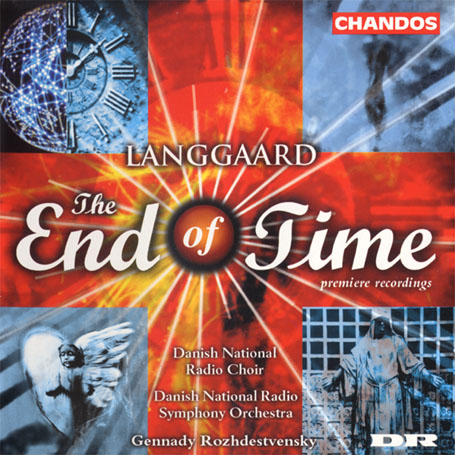Langgaard The End of Time
'Polemic' is the thread connecting four works which grant us the clearest glimpse inside the troubled mind of one of this century's most extraordinary composers
View record and artist detailsRecord and Artist Details
Composer or Director: Rued Langgaard
Label: Chandos
Magazine Review Date: 4/2000
Media Format: CD or Download
Media Runtime: 60
Mastering:
DDD
Catalogue Number: CHAN9786

Tracks:
| Composition | Artist Credit |
|---|---|
| (The) End of Time |
Rued Langgaard, Composer
Danish National Radio Choir Danish National Radio Symphony Orchestra Gennady Rozhdestvensky, Conductor Nina Pavlovski, Soprano Per Høyer, Baritone Rued Langgaard, Composer Stig Andersen, Tenor |
| From the Song of Solomon |
Rued Langgaard, Composer
Danish National Radio Choir Danish National Radio Symphony Orchestra Gennady Rozhdestvensky, Conductor Nina Pavlovski, Soprano Per Salo, Organ Rued Langgaard, Composer Stig Andersen, Tenor |
| Interdikt |
Rued Langgaard, Composer
Danish National Radio Symphony Orchestra Gennady Rozhdestvensky, Conductor Rued Langgaard, Composer |
| Carl Nielsen, Our Great Composer |
Rued Langgaard, Composer
Danish National Radio Choir Gennady Rozhdestvensky, Conductor Rued Langgaard, Composer |
Author: Guy Rickards
The End of Time, a concert suite dating from 1939-40, is based on the original 1921-23 version of the opera Antikrist (see January's issue for the 1926-30 version's recent recording). It's a cantata in four movements (a prelude and three self-contained 'arias') to which Langgaard made further revisions as he assembled it, the whole making a highly effective work that doesn't betray its origins. The text as retained also illustrates, in brief, the radical differences between the two versions of the opera. The shorter From the Song of Solomon (1949) is one of his last works, and typically strays very little from the Straussian opulence of the opening. There is more than a touch of Wagner in the latter stages, and in his fine notes Bendt Viinholt Nielsen points up the influence of Gade. Langgaard's selective use of the Biblical text had a moralistic point aimed at what he felt was the degenerate Danish society of the time.
The orchestral Interdikt (1947-48) is targeted more personally; specifically, at the interdict he believed the Danish musical establishment had placed on him. It is quintessential Langgaard - eruptive, memorable and not a note too long. The role of the organist is an acute autobiographical touch (Langgaard was the organist of Ribe Cathedral at the time).Carl Nielsen, Our Great Composer (1948; the title is also the complete text) presents the less attractive, paranoid side of his creative persona. This sarcastic little hymn is pure doggerel (catchy, though), attacking Nielsen's posthumous pre-eminence and lying mid-way between Bartok's anti-Leningrad Symphony swipe in the Concerto for Orchestra and Hans Werner Henze's disturbed and disturbing Essay on Pigs.
Rozhdestvensky has the measure of Langgaard's idiom, and secures top-notch performances, while Chandos's sound is rich and clear. Langgaard may have composed greater works - Music of the Spheres (9/97), for example - but I for one have learned more about the way the man thought from this single issue than from any other.'
The orchestral Interdikt (1947-48) is targeted more personally; specifically, at the interdict he believed the Danish musical establishment had placed on him. It is quintessential Langgaard - eruptive, memorable and not a note too long. The role of the organist is an acute autobiographical touch (Langgaard was the organist of Ribe Cathedral at the time).
Rozhdestvensky has the measure of Langgaard's idiom, and secures top-notch performances, while Chandos's sound is rich and clear. Langgaard may have composed greater works - Music of the Spheres (9/97), for example - but I for one have learned more about the way the man thought from this single issue than from any other.'
Discover the world's largest classical music catalogue with Presto Music.

Gramophone Digital Club
- Digital Edition
- Digital Archive
- Reviews Database
- Full website access
From £8.75 / month
Subscribe
Gramophone Full Club
- Print Edition
- Digital Edition
- Digital Archive
- Reviews Database
- Full website access
From £11.00 / month
Subscribe
If you are a library, university or other organisation that would be interested in an institutional subscription to Gramophone please click here for further information.





